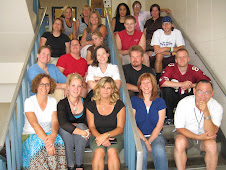What do we make of this experience as a writer and/or as a teacher or writing?
*Consider Because Writing Matters possible
Michael said—snake-eating its tail
For us it was difficult, randomly putting together notes, we both need a starting point, this process was painful
Kelly said we are our students, we are the reflection of our students as we stand before the mirror, we need to be sensitive to the same feelings our students have
Barb and Teri, surroundings and atmosphere are just critical—soft music, aware of how fast everyone else is writing
Thomas and Caroline—various stages of our writing—three pages of good story with paragraphs, Thomas has bullets, the differentiated instruction of eighth graders—fear that I will lose more than I will gain—effectiveness—putting out fires—too many questions—not sure it’s a struggle that I want to deal with—15 on track, 15 struggling—how do you control the needy factor?
7th grade MAP—all map prep, no free thought—when you give them freedom, they flounder—I want to give them freedom, but previous training makes that tough.
Can’t you—give them it a little bit of a time
Zach and Julie—importance of modeling—fear that they will copy exactly what you’ve done
We couldn’t possibly have copied Keri’s.
If you give them a little bit, model your thought process for them, they can’t possible have the same thought processes-the see the struggle
Kelly—won’t some of them take them away from focusing on product? First draft. Done. Negotiate with them and get rid of product.
What grade is it right now?
Notion of abolishing product, how frustrating this was for me to do, did something today that I tell them not to do—I wrote something I didn’t have the words for—forced myself to write more and I wasn’t ready.
Kelly, found myself apologizing for being all over the place.
Never got to the root of why I was writing—tried to force it
Accomplishment—recognizing I wasn’t ready to write about it
Go ahead because it was already on the paper—first thing that came to my mind
We’re so product driven—there is always that end game.
What would be the definition of product?
I’ve got lots of sentences and I was having a teenage angst type of moment. I have to know the end result.
Shelly and Janet—everything I wrote about was connecting—just the connecting—what was negative? One thing was when I was writing I noticed, even though I was writing to myself, I kept making little side comments to you all.
Shelly—connecting personal beliefs with children—seeing connections and associations—watching the visual process—doing the list—showing how random things are and seem to be and see how you can make something of it—starting on that basic level, they look at it so gigantic—doing a list, one short exercise, leave it, keep it in your notebook
Larry and Liz—the list helped me, how can I apply this to teaching? Where I teach. “I don’t know what to write about.” Instead of giving a topic that usually hate. Start with a list. Modeling part of it being very important.
Showing them lots of different ways to approach it. Showing different ways to look it and look at perspectives, giving them those choices in the beginning helps them incredibly, helps all levels
Modeling can be more guided—we’re more sophisticated writers—I would have my list already prepared.
I like showing them the process of how long it takes me to think through—want them to do the same things and take the stupid topics.
When you come in with a prepared list
Several people worried about management
Subscribe to:
Post Comments (Atom)








1 comment:
discussion about modeling for students:
Sophisticated writers in the class will feel comfortable stepping beyond the example that is set before them. For some of these students, the skill will already be a part of their Zone of Actual Development (A term used by Vygotsky and discussed in Wilhelm's IMPROVING COMPREHENSION WITH THINK-ALOUD STRATEGIES--meaning that the skill has already been acquired and the student is comfortable employing that skill). With modeling the student who is in the Zone of Proximal Development (ready to learn the skill) will be able to leap forward and through practice internalize the skill. Where modeling helps the most, I think, is the struggling writer for whom the skill is Beyond the Zone of Proximal Development (This student is not prepared to learn the skill). For this struggling student, the ability to immitate the teacher's model moves them closer to the point where they are ready to learn the skill and apply it on their own. I think that modeling is one of the tools that we store in our SNAP ON rolling cart of strategies to construct effective readers and writers--(thanks, Kelly, for loaning me the SNAP ON toolbox analogy:)
Post a Comment